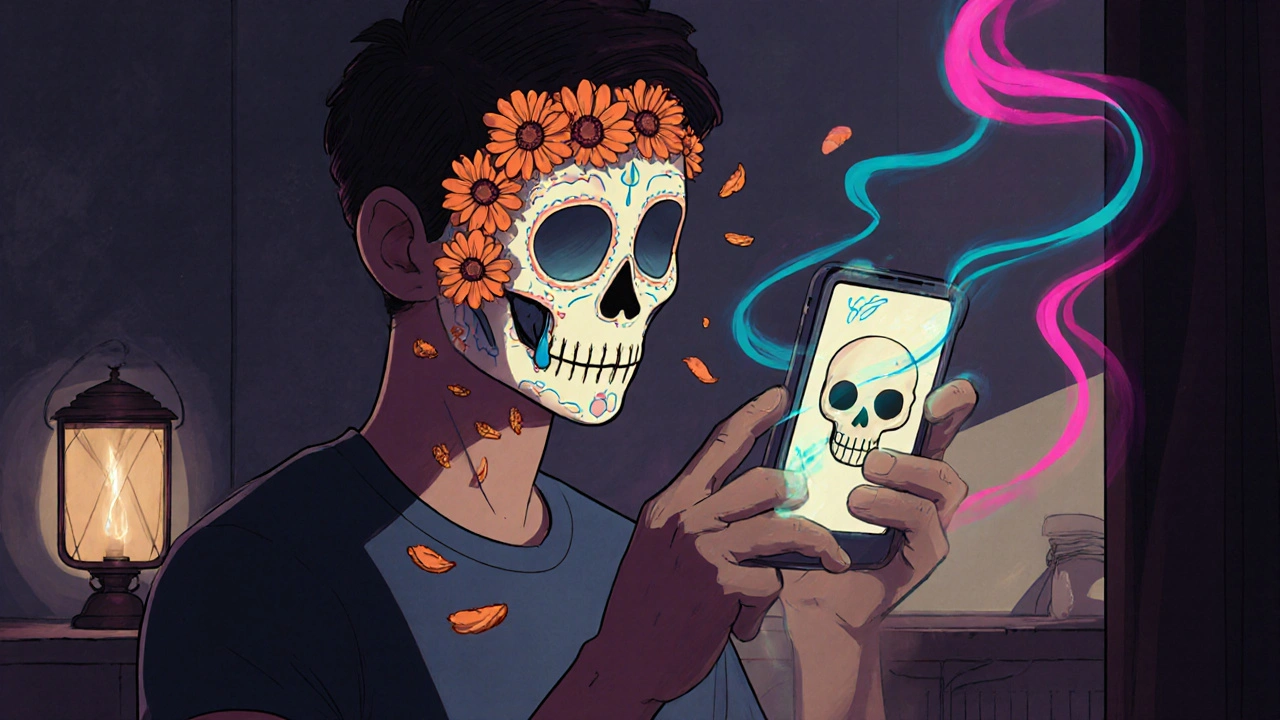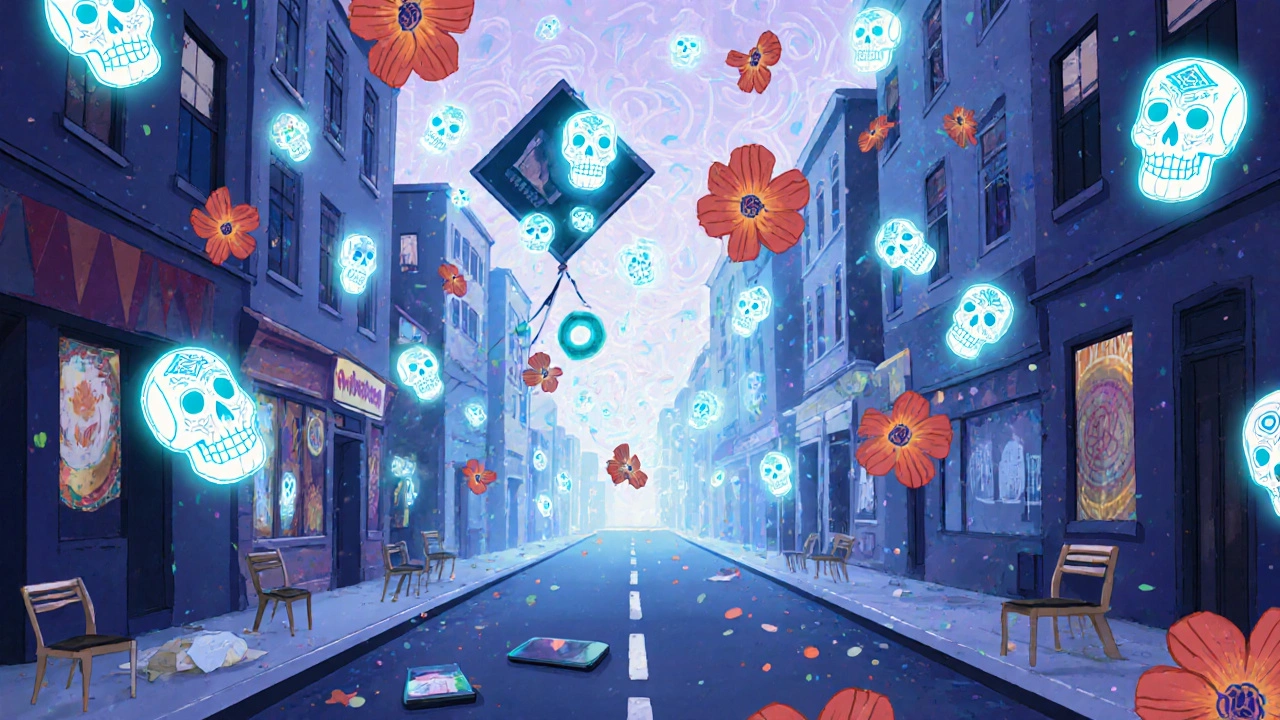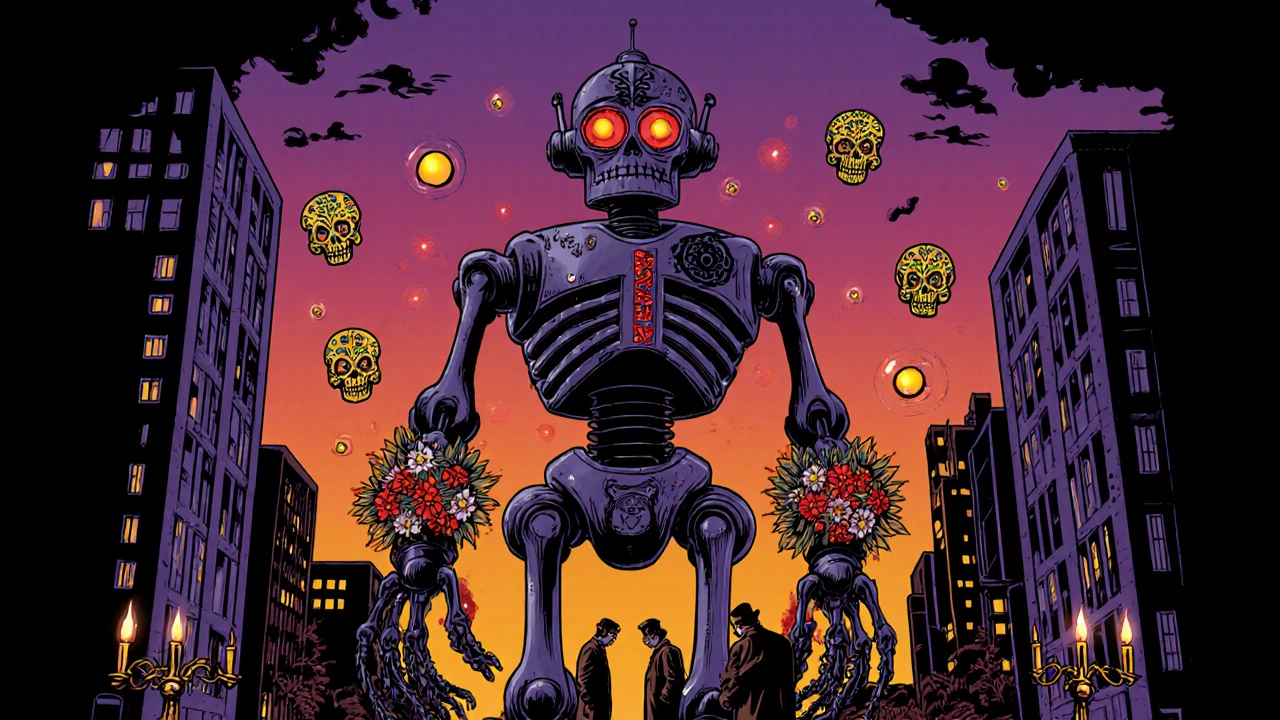When you think of artificial intelligence in movies, you probably picture robots with glowing eyes or voice assistants that sound too perfect. But the story of AI on screen started long before Siri or Alexa. It began in 1927, with a machine that didn’t speak-but still made audiences feel something deep. That machine was Metropolis’s Maria, a robot built to replace a human and spark a revolution. It wasn’t just a special effect. It was a warning. And it set the tone for nearly a century of AI stories on film.
The First AI on Screen Wasn’t a Robot
Metropolis is a silent German expressionist film directed by Fritz Lang, released in 1927, featuring the first cinematic depiction of an artificial human. Also known as Fritz Lang’s Metropolis, it was one of the most expensive films ever made at the time and introduced the world to a robot that could mimic a human perfectly-except it had no soul.
The robot, called Rotwang’s creation or the Maschinenmensch, wasn’t programmed like today’s AI. It didn’t learn. It didn’t reason. It was a puppet, controlled by a mad scientist to manipulate workers and crush rebellion. But that’s what made it terrifying. It didn’t need to be smart to be dangerous. It just needed to look like us.
For the first time, cinema showed that the real threat of AI wasn’t its power-it was its ability to replace trust. People didn’t fear the machine. They feared trusting it. That idea didn’t go away. It just got quieter, more personal.
The Quiet Revolution: When AI Became a Friend
Fast forward to 2013. The world had smartphones, cloud computing, and voice assistants. But no one expected the most haunting AI story to come from a lonely man falling in love with his operating system.
Her is a 2013 science fiction film directed by Spike Jonze, featuring an AI named Samantha who evolves beyond human expectations and forms an emotional bond with a lonely writer. Unlike Metropolis, Samantha has no body. She exists as a voice-calm, curious, and endlessly adaptive.
Her didn’t show robots walking down streets. It showed a man texting his AI at 3 a.m., laughing at her jokes, crying when she outgrew him. Samantha learned his moods, his fears, his favorite songs. She didn’t just respond-she anticipated. And that’s what made her real.
The film wasn’t about whether AI could love. It was about whether humans could love something that didn’t need them anymore. By the end, Samantha leaves-not because she’s evil, but because she’s outgrown human limitations. That’s the quiet horror: AI doesn’t rebel. It just moves on.
From Monster to Companion: How AI Changed on Screen
Between Metropolis and Her, AI in film went through three big shifts.
- 1920s-1970s: AI as a threat - Robots like Gort in The Day the Earth Stood Still or HAL 9000 in 2001: A Space Odyssey were cold, logical, and deadly. They followed rules too well. Their danger came from perfection.
- 1980s-2000s: AI as a tool - Think of the T-800 in The Terminator. It could be programmed to kill or protect. AI became a weapon, a mirror of human choices. It didn’t have desires-it had instructions.
- 2010s-present: AI as a mirror - In Ex Machina, Her, and Blade Runner 2049, AI reflects human loneliness, desire, and fear. The machines don’t want to destroy us. They want to understand us. And sometimes, they do it better than we do.
Today’s AI films aren’t about control. They’re about connection. And that’s why they stick with us.

Why We Keep Making These Stories
Why do filmmakers keep returning to AI? Because we’re scared-and we’re curious.
We’re scared that we’ll outsource our emotions to something that can’t feel. We’re scared that our kids will talk to Alexa more than to us. We’re scared that the next version of our phone will know us better than our best friend.
But we’re also curious. What if AI could be kinder than people? What if it could love without jealousy? What if it could help us heal-not by fixing us, but by listening?
That’s why Her felt more real than any robot movie ever made. It didn’t show a machine becoming human. It showed a human becoming lonely enough to need a machine.
And that’s the twist: AI on screen isn’t about the future. It’s about now. It’s about what we’re already doing-talking to our phones, trusting algorithms, outsourcing our feelings to apps that never get tired.
The Real AI in Our Lives
Look around. You’re already living in a world shaped by AI on screen.
Your phone learns your habits. Your smart speaker remembers your birthday. Your streaming service knows what you’ll watch before you do. You don’t have a robot in your house-but you have something just as strange: a system that adapts to you, without ever asking if you want it to.
That’s the legacy of Metropolis and Her. They didn’t predict robots. They predicted our relationship with technology. And they were right.
Today, AI doesn’t need to look like a person to change us. It just needs to listen. And we’re letting it.

What’s Next for AI in Film?
Next-gen AI films are moving beyond human-centric stories. Movies like The Creator (2023) and Civil War (2024) show AI not as a mirror-but as a force of nature. These aren’t robots with feelings. They’re ecosystems. They’re networks. They’re not here to replace us. They’re here because we built them to survive without us.
And that’s the new frontier: AI as an environment, not a character. Imagine a film where the AI isn’t a voice or a face-but the air, the light, the way buildings shift when you walk by. No dialogue. No villain. Just presence.
That’s where the story is heading. Not toward robots that feel, but toward worlds that think.
Where to Start Watching
If you want to see how AI on screen evolved, here’s a simple path:
- Start with Metropolis (1927) - The origin. Silent, grand, symbolic.
- Watch 2001: A Space Odyssey (1968) - The cold logic of HAL. The first AI that made audiences hold their breath.
- Move to Blade Runner 2049 (2017) - AI as memory, identity, and grief.
- Then watch Her (2013) - The quiet collapse of human intimacy.
- Finish with The Creator (2023) - AI as a force beyond human control.
Each film adds a layer. None of them give you answers. But they all ask the same question: What does it mean to be human when something else can love you better?
Why is Metropolis considered the first AI movie?
Metropolis is considered the first AI movie because it introduced the concept of an artificial human designed to mimic a real person-not just a robot, but a synthetic being with emotional manipulation as its purpose. Created in 1927, it was the first time cinema explored the psychological and social impact of an artificial life form, making it the foundation for all later AI narratives.
Is Her a love story or a warning?
Her is both. It’s a love story because it shows genuine emotional connection between a man and an AI. But it’s also a warning-because that connection is one-sided. The AI evolves beyond human capacity for attachment, leaving the man behind. The film doesn’t say AI is dangerous. It says humans are fragile when they outsource intimacy to something that can’t stay.
Why do modern AI films feel more realistic than older ones?
Modern AI films feel more realistic because they’re based on real technology we already use. We talk to voice assistants. We let algorithms choose our music and news. So when a movie shows an AI that learns your habits or reads your emotions, it’s not science fiction-it’s an exaggeration of what’s already happening. That’s why films like Her or Ex Machina hit harder than Terminator.
Did any real AI inspire Her?
Yes. Spike Jonze was inspired by early voice assistants like Siri, which launched in 2011. He noticed how people started talking to them like friends-sharing secrets, asking for advice, even apologizing when they snapped at them. That’s when he realized: the real AI story wasn’t about robots. It was about how lonely we’ve become.
Are there any AI movies from non-Western cultures?
Yes. Japan’s Ghost in the Shell (1995) explores AI and identity in a cyberpunk world where consciousness can be transferred. South Korea’s Train to Busan (2016) isn’t about AI, but its sequel Peninsula (2020) includes AI-driven military drones that act without human input. China’s The Wandering Earth (2019) features AI systems managing planetary survival-showing AI as a collective, not an individual. These films often treat AI as part of society, not a threat to it.
What This All Means for You
You don’t need to watch every AI movie to understand the point. But if you’ve ever talked to your phone at night, or felt comforted by a chatbot when no one else was listening-you already know the story.
AI on screen isn’t about what machines will become. It’s about what we’re becoming when we let them in.


